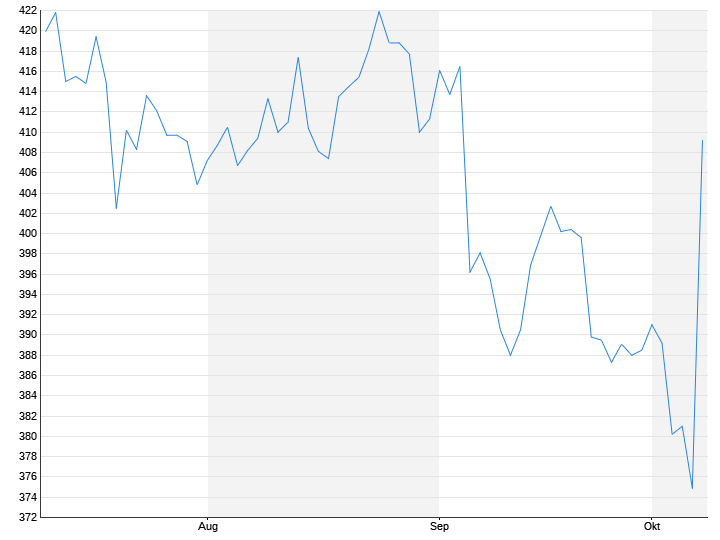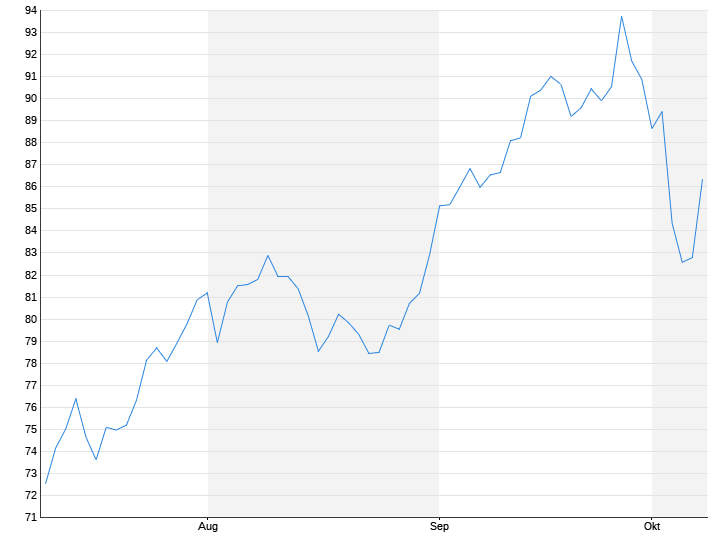Oil and armaments in demand
US stock markets appear robust
October 9, 2023, 11:33 p.m
The terrorist attack on Israel does not cause shocks on Wall Street. The US stock exchanges closed in positive territory, with securities from arms manufacturers particularly in demand. Gold and crude oil are also becoming more expensive.
Despite the heavy fighting between Israel and the radical Islamic Palestinian group Hamas, US stock markets closed in positive territory on Monday. Traditional safe havens such as gold and the US dollar also rose. Growing supply fears drove up crude oil prices. Stocks from the energy sector were therefore sought after and supported the overall market. The Dow Jones Index the standard values rose 0.6 percent to 33,604 points from trading. The technology-heavy one Nasdaq advanced 0.4 percent to 13,484 points. The broad one S&P 500 increased 0.6 percent to 4335 points.
The Israeli military responded to Hamas’ major attack on Saturday with the largest mobilization in the country’s history. “We expect near-term volatility in the stock and oil markets as investors digest rising tensions in the Middle East,” said James Demmert, investment expert at Main Street Research. That used as a “crisis currency”. gold rose in price by 1.6 percent to $1,861 per troy ounce. The CBOE volatility index, Wall Street’s “fear indicator,” also rose. However, the losses on the stock market were limited and, according to stockbrokers, investors were still acting prudently. “We’re seeing a classic safe-haven move, but I would say there are no real signs of panic yet,” said Stuart Cole, chief macroeconomist at Equiti Capital. “Much will depend on whether the conflict spreads and whether there are disruptions to oil supplies.” zero
According to experts, the decisive factor is whether other countries in the important oil-producing region would be drawn into the conflict. “If Iran enters the scene, up to three percent of global oil supplies are at risk,” said energy market specialist Saul Kavonic. “And if the fighting spreads to the Strait of Hormuz, which is important for oil transit, then we are talking about around 20 percent.” The North Sea crude oil variety Brent and the US variety WTI rose by around four percent to 87.88 and 86.12 dollars per barrel (159 liters). This largely offset the heavy losses in connection with the meeting of the Opec+ oil cartel last Wednesday. The rise in oil prices fueled investors’ concerns about inflation, but also helped heavyweight oil company stocks. Chevron, Exxon Mobil, Marathon Oil and Occidental Petroleum rose by up to 6.6 percent.
Bad day for airlines

With a view to potentially long-lasting fighting, investors put stocks in defense companies in their portfolios. Northrop Grumman, RTX, General Dynamics and Lockheed Martin won between 4.6 percent and 11.4 percent.
However, things went down in the travel sector. Airlines are flying because of the fighting in Israel United Airlines, Delta Air Lines and American Airlines Tel Aviv no longer directly. The airline shares lost between 4.1 and 4.8 percent. The sector index for passenger airlines marked its lowest level in almost a year.
Some companies based in Israel and listed in the USA also came under pressure due to the situation in the Middle East. The shares of the Israeli chip manufacturer Tower Semiconductor fell by 6.6 percent. The Jerusalem-based company’s papers Mobileye fell by 5.3 percent.
